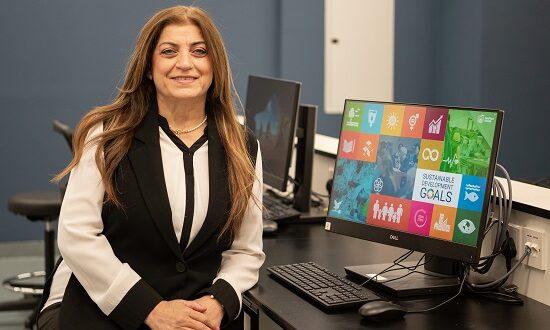AUS professor’s research endeavors contribute to sustainable transformation and innovation
A distinguished American University of Sharjah (AUS) researcher and professor of industrial engineering, Dr. Vian Ahmed is leading research that lies at the center of AUS’ unwavering dedication to sustainability. Her studies delve into the economic, environmental and social dimensions of this important field.
“Sustainability is a cross-cutting concept that has become integral to all fields, impacting world economies, social fabrics and the built environment. Economically, net-zero buildings consume 38 percent less energy than traditional buildings, resulting in significantly reduced CO2 emissions as well as lower energy costs. Socially, it became important to be mindful of the long-term impact of what became known as ‘social sustainability’ on employee retention and productivity. Environmentally, there is a lot to be said about how much energy and food we consume and the waste we produce,” said Dr. Ahmed.
Her research aligns with the UAE’s efforts to meet its Net Zero 2050 strategic initiative as well as the country’s preparations for hosting the upcoming COP28.
In her research, Dr. Ahmed’s focus on the economic aspects of sustainability supported her research on sustainable university campuses and retrofitting traditional buildings.
She developed a multi-criteria decision support tool that helps decision-makers create cost-effective investment choices, facilitate the gradual integration of smart technologies into campuses and foster a more sustainable educational environment. This mathematical tool relies on inputs to generate outputs, assisting in determining the most strategically viable smart campus solutions to address current needs. Given the numerous criteria for a smart campus, rather than undertaking an expensive full transformation, the tool aids decision-makers in selecting the most feasible smart campus criteria in terms of cost and impact.
She also noted that more financial, technical, social and policy work is required to transform traditional homes into sustainable ones.
Her interest in social sustainability led her to use mixed research approaches that focus on the fundamental principles of operations management, gaining a deeper understanding of work environments and their impact on the mental health of employees and work productivity to inform the choices of decision makers.
Also, her supervision of an AUS doctoral study resulted in the development of a decision support tool to aid in the identification of cost-effective solutions to improve employee performance, progression and engagement within the UAE construction industry.
In her focus on the environmental dimension of sustainability, Dr. Ahmed’s research centered on solid waste generation.
Heading a team comprising AUS undergraduate and graduate students, Dr. Ahmed developed an accurate machine learning model that identifies patterns and relationships between socio-economic factors and solid waste generation, providing valuable insights for policymakers on effective waste management strategies.
“The findings suggested that economic growth alone, as measured by Gross Domestic Product (GDP), may not be the primary driver of waste generation. Instead, the countries’ Gross National Income (GNI), which takes into account income generated domestically and abroad, and indicates a shift towards a more affluent lifestyle, potentially results in the generation of the more non-biodegradable waste and packaging materials. As such, policymakers and waste management authorities should consider GNI as a factor when designing waste management strategies and policies,” she said.
Dr. Ahmed’s research has been published in peer-reviewed journals and has received support from Faculty Research Grants at AUS. She has also actively participated in seminars and conferences enriching the sustainability conversation among industry stakeholders, policymakers and regulators.
Speaking on her future research endeavors, Dr. Ahmed said: “These studies have paved the way for several other research avenues, including developing a sustainability index for higher education institutions and investigating motivational factors and behavioral attitudes towards recycling. Additionally, I aim to explore the practical applications of smart technologies in real-life settings to promote the concept of a smart campus.”
AUS is widely recognized for its sustainability initiatives and its faculty members are actively leading and contributing to this field. The university is a member of the Universities Climate Network, which comprises UAE-based universities and higher education institutions facilitating dialogues, workshops, public events and youth participation in the lead up to COP28. With the goal to reduce carbon emissions, AUS has developed its first comprehensive Climate Action Plan, which further aligns the university’s sustainability efforts with the UAE’s Net Zero by 2050 strategic plan. AUS is a member of the UAE Alliance for Climate Action (UACA), a domestic alliance of stakeholders led by Emirates Nature-WWF. UACA is the flagship non-state actor program for the UAE in the lead up to COP28, which aims to increase momentum towards achieving net zero targets in line with science and the Paris Agreement.
To know more about the College of Engineering, please visit: www.aus.edu/cen.
 التكنولوجيا وأخبارها بوابة الإمارات لتكنولوجيا المعلومات والإتصالات
التكنولوجيا وأخبارها بوابة الإمارات لتكنولوجيا المعلومات والإتصالات





